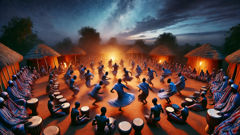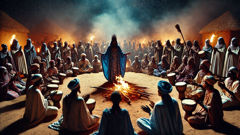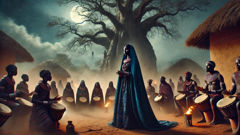Introduction
Long before the first European traders crossed the Sahara and before the mighty city-states of Kano and Katsina filled the pages of history, the Hausa lands were a tapestry of sun-baked earth, rolling savannahs, and the slow winding rivers that carved the land into a thousand stories. These were lands where millet swayed in the hot breeze, where baobabs stood like ancient sentinels, and where every stone and whisper of wind seemed haunted by memory. Here, among scattered villages and bustling market towns, a tradition older than memory itself flourished—the worship of the Bori spirits. The Bori were everywhere, or so the elders said: in the shadows beneath the great trees, in the shimmer of dawn’s first light, in the thunder that rolled over the Zaria plains. Some called them guardians, others feared them as mischief-makers, but all agreed that their power was real. It was in this world, both visible and invisible, that the legend of Nana Dala was born—a legend that would ripple through centuries, shaping faith and healing in equal measure. Nana Dala was born beneath an ochre moon, her first cry echoing through the night as if answered by drums only she could hear. Her mother, a renowned priestess, swaddled her in indigo cloth and whispered the old invocations for protection. As she grew, Nana walked with the restless energy of a river after the rains. She asked questions the elders struggled to answer. She watched the ritual dances with wide, unblinking eyes, her small hands mimicking the gestures of the spirit mediums as if she’d done it all before. The elders began to murmur that she was marked by the Bori—chosen, perhaps, or cursed. But Nana’s mother only smiled, her faith unshaken. As droughts came and went, as markets swelled with laughter and grief in equal measure, as the world seemed both unchanged and ever-changing, Nana’s bond with the unseen deepened. The day would come, the old priestesses said, when she would be called to serve, to step through the veil between worlds. But no one could have foreseen how that day would arrive: with a sickness that swept through the land, turning even the bravest faces to fear, and with a darkness that settled in the hearts of all who called upon the spirits for relief. In the legend of Nana Dala and the Bori, the destinies of mortals and spirits would collide—and the balance between healing and destruction would hang by a single thread of song.
The Gathering of Shadows
The year the sickness came, the air was heavy with dust and the scent of withered grass. The village of Karo, nestled between two rocky outcrops and bordered by a sluggish river, was usually a place of laughter and music. But the laughter faded quickly as the first fevers appeared. It started with the children—restless sleep, burning skin, whispers of spirits in their delirium. The mothers wept and fathers carried their sons and daughters to the hut of Maiga the healer, but her herbs did little. The old men gathered in the shade of the tamarind tree, voices low with worry. No one spoke aloud of curses, but everyone wondered. At dusk, as shadows lengthened, the village council summoned Nana Dala’s mother. The chief’s eyes were rimmed red with exhaustion. “We have tried all else. We need the Bori,” he said. “You are the only one who can reach them.” Nana watched from behind a curtain of reed as her mother gathered her talismans and powders, her beads clattering softly. She saw the fear etched into every line of her mother’s face. That night, the priestess stood before the sacred grove, chanting to call the Bori. The drummers pounded their rhythms—fast, faster—until the air itself vibrated. But when the priestess fell into trance, nothing came. No spirits answered. Nana watched as her mother staggered home, shoulders slumped. The next day, Nana found her mother feverish and delirious, muttering to spirits no one else could see. It was as if the very guardians of the land had turned their backs. The council sent for other priests and herbalists from distant towns, but the sickness only spread. In the markets, whispers grew louder: the Bori are angry. Someone has broken the old taboos. It was then, in the midst of mounting dread, that Nana began to dream. In her sleep, she saw a path winding through the savannah, lined with silver grasses. At its end, a figure waited—tall and faceless, robed in shifting colors. Around its feet danced flames that did not burn. Nana awoke each time with her heart racing, certain the dream was a summons. On the third night, she rose before dawn, wrapping herself in her mother’s faded shawl. She walked to the grove as the first light crept over the horizon. There, she knelt before the old baobab and began to sing the invocation she’d heard since childhood. Her voice was shaky at first, but the rhythm took hold, a pulse older than memory. The wind stirred, carrying the scent of rain. Leaves rustled. Then, suddenly, she felt a presence—heavy, ancient, and watching. A single word formed in her mind: "Come." Nana returned to the village with a new determination. She told the council she would seek the Bori herself. Some scoffed—she was too young, too inexperienced—but desperation outweighed doubt. Preparations for the grand ritual began at once. The square was swept clean, offerings laid out: kola nuts, honey, millet cakes, and carved wooden figures for each major spirit. Drummers and singers gathered from neighboring villages, their faces painted with ochre and chalk. As dusk fell on the appointed day, the air shimmered with tension. Nana stepped into the center, surrounded by the circle of priestesses. She closed her eyes and let the music carry her. The rhythms pounded through her feet and up her spine, faster and faster, until her body moved without conscious thought. In a swirl of color and sound, Nana felt herself slipping—falling through layers of silence and darkness. She glimpsed faces old and young, masks and animal forms flickering at the edges of vision. The world twisted and stilled. Then, as if a door had opened inside her chest, she heard a hundred voices whispering in a language she’d never learned but somehow understood. The Bori had come.

Voices from the Beyond
Inside the trance, Nana felt as though she floated above the world, yet was more present than ever before. The earth’s pulse thudded in her bones. A chorus of voices greeted her—each distinct, some harsh and guttural, others melodic and soothing. She saw shapes swirling around her: a lion with fiery eyes, a woman cloaked in lightning, a child with a crown of feathers. These were the Bori, each an embodiment of spirit and element, of memory and mystery. The lion spirit spoke first, its voice like distant thunder. "You have come seeking what was lost," it intoned. "Why should we answer?" Nana’s heart trembled, but she stood her ground. "My people suffer. The old ways have grown weak. Help me restore the balance." The child spirit skipped closer, laughing with a voice like birdsong. "Balance must be paid for," it sang. "What will you give?" "Whatever you ask," Nana replied, though she feared what that might mean. The woman of lightning circled her slowly. "The world has changed. Many forget us. Some fear us. If you would wake the Bori, you must journey into the darkness—where sickness and shadow breed." With that, Nana felt herself plummeting, spinning through visions: her mother writhing in fever; villagers lighting fires to ward off spirits; children crying for lost siblings. Then—a moment of stillness. She stood at the edge of a great river, its waters black as ink. Across the river, spirits beckoned. Nana understood: to heal her people, she must let a Bori possess her fully—crossing the boundary between life and the spirit world, risking her very self. She remembered the tales: the possessed sometimes returned changed, never truly themselves again. But she had no choice. Nana called to the lion spirit. "Take me. Show me what I must do." In an instant, fire roared through her veins. Her limbs moved of their own accord; her voice deepened, echoing with an ancient power. She saw through the lion’s eyes—into the hearts of those around her. The village square blurred into a world of shifting energies: auras of sickness tangled like knots around each sufferer. Nana, now spirit-possessed, called for fire and water. She sang a new song—one she’d never heard but knew by heart. The other priestesses joined in, their voices weaving together. The Bori chanted through them, old rhythms pulsing back to life. As dawn broke, Nana collapsed, exhausted and trembling, but alive. The fever in her mother broke that very hour. One by one, the sick began to recover. The village erupted in relief and gratitude. Yet Nana knew this was not the end. The Bori demanded more than thanks. That night, as she lay beneath the baobab, she felt the spirits stirring again—restless, hungry for remembrance and respect.

The Price of Healing
The return of health brought jubilation, but also uncertainty. Some villagers whispered that Nana was no longer truly herself; others lined up at her door, desperate for blessings or cures. The chief invited Nana to sit at his side during council meetings. But Nana felt a growing heaviness—an awareness that the Bori’s gifts came with a cost. The lion spirit prowled her dreams, always watching. The lightning woman flickered at the corners of her vision during storms. Children stared at her with wide, wondering eyes. One evening, as fireflies glimmered over the riverbank, Nana’s mother joined her in silence. "Are you afraid?" she asked gently. Nana hesitated before answering. "I am not afraid of the Bori. I am afraid of forgetting who I am." Her mother nodded, tracing protective symbols into the dust between them. "Remember, the Bori are many things. They can heal, but they can also demand. Never let your heart become just a vessel. Keep a piece for yourself." Days passed in a blur of ritual and recovery. Nana led more ceremonies—sometimes alone, sometimes with her mother or the other priestesses. Each time she summoned the Bori, she felt herself slip further from ordinary life. The line between spirit and self blurred: she laughed with voices not her own, wept with griefs she’d never known. She learned to call not only the lion but other spirits: the healer of waters, who soothed fevers; the trickster hare, who drove away nightmares; the ancient ancestor, who whispered lost secrets into her ear. The village flourished. Crops grew tall again; wells filled with clear water; strangers came from distant lands to seek Nana’s counsel. Yet some dangers remained invisible. A merchant from the north arrived one market day, boasting of powerful new medicines and offering gifts of cowrie shells and silk. He warned against the "old superstitions," urging villagers to abandon ritual for trade and science. Some were tempted. Nana watched, torn between anger and uncertainty. That night, the Bori appeared in her dreams, agitated and mournful. The lightning woman spoke: "If they forget us, we fade. If you let go, who will remember?" The next morning, Nana gathered the village in the clearing. She spoke not just of healing, but of memory—of the stories woven into land and song, of the spirits who had shaped their world long before trade or coin. She led them in a ritual of gratitude: drummers pounded out the heartbeats of ancestors, children danced in masks painted with ancient symbols, elders recited tales of the first Bori. As the music rose and firelight danced across faces, Nana felt something shift. For the first time since her possession, she sensed not just the power of the Bori but their joy—a mingling of worlds, not a contest for dominance. In that moment, Nana understood: healing was more than banishing sickness. It was remembrance, reverence—a promise never to let the unseen slip away.

Conclusion
As seasons turned and generations passed, Nana Dala’s legend grew. In distant towns, her name became a byword for courage and wisdom. It was said that on certain nights, when the moon hung low and the baobab cast giant shadows across the earth, one could hear the distant echoes of drums—the heartbeat of the Bori—calling the living to remember their roots. The rituals continued: new priestesses learned the songs; children listened wide-eyed to stories by firelight; even as villages modernized and markets bustled with goods from distant lands, the sacred grove remained untouched, a place where old and new worlds met. Nana herself grew older but never lost her fire. She taught that true healing came not just from herbs or spirits, but from honoring the ties that bound people to each other, to land, to memory itself. When she died, it was said that the Bori wept—a gentle rain fell on parched earth, and wildflowers bloomed where her body was laid to rest. In time, others would walk her path: some with fear, some with pride, all with a deep reverence for the mysteries that dance just beyond sight. And so the legend of the Bori endures—a testament to faith, to resilience, and to the wisdom that whispers through even the darkest of times.













